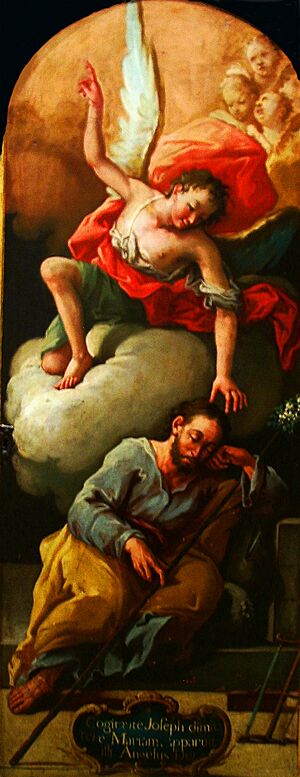José Luzán facts for kids
José Luzán (born 1710 – died 1785), also known as José Luzán y Martínez, was an important Spanish painter from the Baroque period. He was known for his beautiful religious paintings and for teaching many famous artists.
Contents
Early Life and Training
José Luzán was the son of Juan Luzán, who was also a painter. Juan Luzán specialized in painting and decorating retablos, which are large, often decorated structures behind altars in churches. José Luzán married Teresa, whose father, John Zabalo, was also a painter.
Thanks to the support of the Pignatelli family, José Luzán got to study art in Naples, Italy. While there, he met a famous Italian Baroque artist named Giuseppe Mastroleo. This experience helped him learn new painting techniques and styles.
A Successful Career
Around 1730, Luzán returned to Zaragoza, Spain. He opened an art academy there, which became very popular and successful. Many young artists came to learn from him.
His talent was recognized by important people. He was chosen by the Spanish Inquisition to review paintings. In 1741, King Philip V of Spain named him a special painter for the Royal House. This meant Luzán could study the amazing art collections in the palace. This helped him make his own painting style even better.
At first, his paintings had a darker feel. But over time, he started using warmer colors like yellow, orange, and red. His brushstrokes also became lighter. In the 1760s, he created large and impressive artworks. These paintings showed that he was one of the most talented religious painters of the 1700s.
Teaching Future Masters
Luzán was highly respected as a teacher. He helped many students become great artists themselves. Two of his most famous students were Francisco Bayeu y Subías and the world-renowned Francisco Goya. Goya, in particular, became one of Spain's most important painters.
Later Years and Legacy
Later in his life, Luzán left Madrid to lead the Academy of Painting and Sculpture in Zaragoza. However, the academy faced money problems and had to close for a short time. He worked hard to get it reopened in 1784. Sadly, his health was not good enough for him to continue teaching. José Luzán died in his hometown in 1785. His influence on Spanish art, especially through his students, remains very important.
See also
In Spanish: José Luzán para niños
 | John T. Biggers |
 | Thomas Blackshear |
 | Mark Bradford |
 | Beverly Buchanan |


